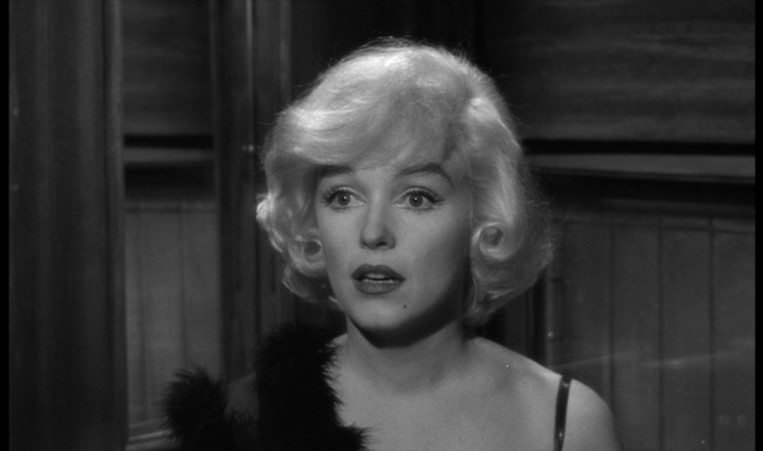
(I looked and saw that my 3rd post wasn't on here - I guess it didn't work when I tried to post it. Anyway, here it is.)
I thought I’d take a look at a few more prominent comediennes and comedic actresses of the 1970s, because there are quite a few, and they are all unbelievably talented. The 1970s were a time that saw lots more comedic roles for women – however, there was still progress to be made concerning women in comedy. Like Katharine Hepburn in “Bringing Up Baby” and Marilyn Monroe in “Some Like it Hot,” Diane Keaton is funny in “Sleeper” because she’s ditzy, a little bit crazy, and not very bright. The brilliant Madeline Kahn also played stereotypical female roles in the comedies of Mel Brooks, and although she had more screen time than any other women in these films, she was only onscreen for less than a handful of scenes. Also, not too surprisingly to me, a Google search of "women in comedy 1970s" proved to be far less than fruitful. However, these talented women paved the way for more three-dimensional, complex female comedic roles in the decades to come.

The 1960s TV variety show
“Rowan & Martin’s Laugh-In” introduced who would become two of the most talented female comics of the ‘70s: Lily Tomlin and Goldie Hawn. When Hawn won the Best Supporting Actress Oscar for her role in the 1969 farce
“Cactus Flower,” Time Magazine called her “a natural reactress; her timing is so canny that even her tears run amusingly.” Hawn later made a memorable appearance alongside Warren Beatty and Julie Christie in the 1975 Hal Ashby satire
“Shampoo.” Tomlin had memorable roles in the farce
"Nine to Five" (1980),
"All of Me" with Steve Martin (1984), and two more recent David O. Russell films - "Flirting With Disaster" and "I Heart Huckabees." Watch Russell and Tomlin at each other's throats on set
here.

Some other notable 1970s comediennes who came from television were Carol Burnett and Gilda Radner. Lucille Ball was Carol Burnett’s mentor.
“The Carol Burnett Show,” a variety program featuring Burnett in countless hilarious and memorable roles, ran from 1967-78 and was a huge hit. Burnett later appeared as the mean Miss Hannigan in the film version of the musical
"Annie" (1982). Gilda Radner, one of the original female cast members of “Saturday Night Live,” gave us Roseanna Roseannadanna and Baba Wawa. She met husband Gene Wilder on the set of the 1982 romantic comedy
“Hanky Panky,” directed by Sidney Poitier. Another of the many talented female comedic actresses who worked with Gene Wilder was
Teri Garr, who appeared in Mel Brooks’
“Young Frankenstein” (1974),
“Oh, God!” (1977), and
“Tootsie” (1982), for which she was nominated for the Academy Award for Best Supporting Actress.

Luckily, we are once again experiencing a period ripe with successful women in comedy – Tina Fey (if you don’t watch
“30 Rock,” you should – it’s one of the funniest, smartest shows on television right now), Amy Poehler, Sarah Silverman, Kristen Wigg, Amy Sedaris, and Leslie Mann, to name a few - in both television and film. These women have been hailed for being not just funny, but smart and sexy as well. In Vanity Fair magazine in January 2007, Christopher Hitchens wrote an article called
"Why Women Aren't Funny." Obviously, the article caused quite a backlash, and Vanity Fair published a response article by Alessandra Stanley entitled
"Who Says Women Aren't Funny?" The cover featured Silverman, Fey, and Poehler copping a feel. However, I agree that the argument of the second article was weak, basically saying "There are a lot of funny women! But in order to be accepted as funny, they have to be hot too." Male comedians don't have to be sexy, but women do, otherwise they are classified by people like Christopher Hitchens as butch, dykes, and Jews. Here is Hitchens' rebuttal to the response to his article:
Why Women Still Aren't Funny.
Unfortunately, despite all of these female talents, sexism is still ripe in the comedy genre. Judd Apatow's
"Knocked Up" (2007) was hailed for giving comedic actresses, like the very funny Leslie Mann, a chance to shine in larger roles in comedies that weren't considered "chick flicks," but there was still a large response -
including that from the star, Katherine Heigl - saying that these roles were sexist. Women in comedy have come a long way since the '50s with the help of many talents, especially those in the '70s, but how long will it be before women can be widely accepted as funny people, not just as funny women?

















